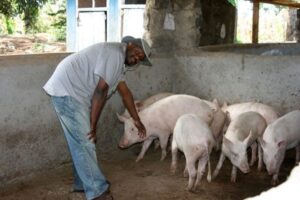 After 45 minutes of a torturous drive on pothole-riddled Nakuru-Nyahururu road, we finally arrive at Ezra Waweru’s farm at Ahero village, Bahati, Nakuru.
After 45 minutes of a torturous drive on pothole-riddled Nakuru-Nyahururu road, we finally arrive at Ezra Waweru’s farm at Ahero village, Bahati, Nakuru.
We are ushered into his compound by storey structures that occupy about 10 by 100 feet of his two-acre farm.
The wooden structures are sties in which pigs are chewing away on fodder. Some can be seen resting while others are snuffing and snouting. Some sows and boars are in droves of 10 to 15 while others are alone in their sties.
“The one who is lying on hay is about to deliver. Once she starts moving hay to a corner, I’ll know that she is about to give me a new litter of piglets and my attendant will keep watch,” says Waweru, 35
In another sty are two hungry-looking pigs. “These ones gave birth recently and are recovering. They have been secluded so that they can be given more food with added proteins for body-building,” says Waweru.
Yet in another are tens of piglets. Waweru shows us one dominant piglet that is feared and revered in equal measure by the rest. This, he says, is usual in the pig kingdom.
From his explanation, Waweru could easily be mistaken for an animal health officer. But he is an Information Technology expert who worked in the United States for nine years but returned to Kenya in 2010. “I imagined if one day I would lose my job and would have to come back to Kenya. So I researched and found out that farming would be a good way to make money,” he says.
NOT PASSIONATE ABOUT FARMING
He adds that he is not necessarily very passionate about farming but he loves making extra money.
Waweru, who still works as an IT manager at a bank in Nairobi, leaves the farm under the care of his three employees headed by a general manager who keeps his boss posted on goings-on at the farm.
Before stocking pigs in July last year, Waweru had broken even in dairy farming at the farm that his mother used to lease out for Sh2,000 a month.
He still has his four Friesians and two Ayrshires from which he milks Sh80,000 a month.
He bought two expectant pigs at Sh80,000 in July 2013 after his friend convinced him that their returns were handsome. To his pleasant surprise, one delivered 14 piglets a day later. The second one gave birth two weeks later to 16 piglets. Encouraged, Waweru bought another eight pigs from a farmer in Lanet.
Today, he boasts of a drove of 140 pigs and counting. So far, he has sold 60 pigs at between Sh12,000 and Sh15,000.
“I had never associated pigs with a flood of income. This is the best decision I’ve ever made in my life,” he says. “I discovered that keeping pigs is very easy — you just feed them in the morning, clean their sties during the day and feed them again in the evening.”
The part-time farmer had thought of selling his pigs to a major pork-processing firm but their offer was unattractive and he sought another market.
“The firm demanded that my pigs must weigh a minimum of 100 kilogrammes and they were offering me Sh180 a kilo,” he says.
The farmer felt that was a tall order and settled for local butchers, who offered him Sh180 a kilogramme and were ready to take pigs weighing between 79 and 85 kilos.
The later price has since shot up to Sh220 as demand for pork is steadily rising. In the next three months, Waweru has 50 pigs ready for sale — 15 in December, 17 in January and 18 for February.
“There is so much demand I can hardly meet it,” he says.
COMMERCIAL FEEDS
He feeds his pigs on commercial feeds and weans young ones at four weeks.
“They breast-feed exclusively for four weeks and I allow them to feed on their mother’s sow weaner before introducing pig starter at six weeks,” he says
Feeding on sow weaner starts at between 11 and 19 weeks followed by pig-finisher feeds.
Dr Githui Kaba, a veterinary officer in Nakuru, recommends that pigs should be fed on commercial feeds containing proteins, minerals, vitamins and energy-giving components.
Dr Kaba adds that pig farmers should never feed their animals on hotels left-overs because they contain parasites.
He says pig farmers must also observe the law that bans letting the animals feed in the open.
Pig sties, the expert says, should have four sections — one for water, another for food, a place to sleep and place to dump droppings.
This is because pigs collect a lot of parasites with the most common one being trichinella.
“Trichinella gets absorbed into pork and causes trichinellosis infection when consumed by humans,” he says.
-nation.co.ke










Good for him. He was not a nice person in the past. Hopefully he is more humble and treating people with respect these days. All the best!